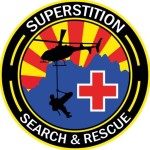Community Emergency Response Team

Who is Superstition Search and Rescue?
For over three decades we have provided our community and state with an accredited and very successful Wilderness Search & Rescue Team that has been locally and nationally recognized and honored for its achievements and contributions to the SAR community. Today wilderness search and rescues calls are primarily handled by county and state helicopters with small support ground teams, but we continue to respond to active and cold cases when requested.
We have grown into a professional and social organization of local volunteers that maintain highly trained skills to be used under the direction of the Apache Junction Police Department. When called we rapidly  respond and assist the community with any incident, emergency or disaster that requires assistance, especially the locating of missing, injured or overdue citizens. We’ll use our team to perform a large number of tasks needed in emergencies. This frees other trained professional (paid) responders for more technical tasks. Much of our training concerns the Incident Command System and organization, so our members fit easily into larger command structures.
respond and assist the community with any incident, emergency or disaster that requires assistance, especially the locating of missing, injured or overdue citizens. We’ll use our team to perform a large number of tasks needed in emergencies. This frees other trained professional (paid) responders for more technical tasks. Much of our training concerns the Incident Command System and organization, so our members fit easily into larger command structures.
Our team may self-activate when our community is affected by disaster. An effort will be made to report our response status to the sponsoring agency. Our team will size-up the loss and begin performing skills to minimize further loss of life, property, and environment. We will continue to respond safely until redirected or relieved by the sponsoring agency.
Our Mission
Is to provide our community, local law enforcement and emergency services a well trained resource for emergency assistance and support.
What is C.E.R.T.?
Following a major disaster, first responders who provide fire and medical services will not be able to meet the demand for these services. Factors such as number of victims, communication failures and road blockages will prevent people from accessing emergency services they have come to expect at a moment’s notice through 911. People will have to rely on each other for help in order to meet their immediate life saving and life sustaining needs.
One also expects that under these kinds of conditions, family members, fellow employees and neighbors will spontaneously try to help each other. This was the case following the Mexico City earthquake where untrained, spontaneous volunteers saved 800 people. However, 100 people lost their lives while attempting to save others. This is a high price to pay and is preventable through training.
If we can predict that emergency services will not meet immediate needs following a major disaster, especially if there is no warning as in an earthquake and people will spontaneously volunteer, what can government do to prepare citizens for this eventuality?
First, present citizens the facts about what to expect following a major disaster in terms of immediate services. Second, give the message about their responsibility for mitigation and preparedness. Third, train them in needed life saving skills with emphasis on decision making skills, rescuer safety and doing the greatest good for the greatest number. Fourth, organize teams so that they are an extension of first responder services offering immediate help to victims until professional services arrive.
CERT is about readiness, people helping people, rescuer safety and doing the greatest good for the greatest number. CERT is a positive and realistic approach to emergency and disaster situations where citizens will be initially on their own and their actions can make a difference. Through training, citizens can manage utilities and put out small fires; treat the three killers by opening airways, controlling bleeding, and treating for shock; provide basic medical aid; search for and rescue victims safely and organize themselves and spontaneous volunteers to be effective.
